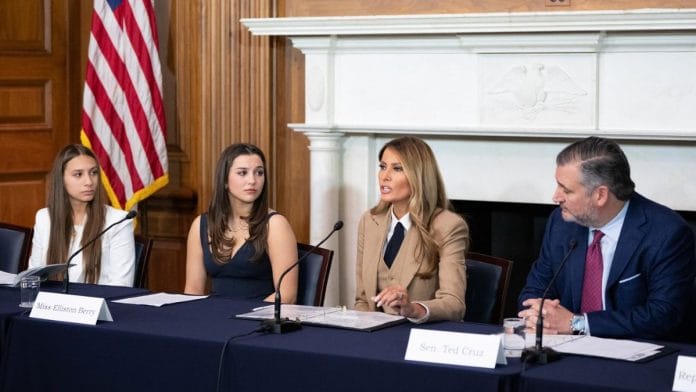New Delhi: US First Lady Melania Trump made her first solo public appearance since resuming her role, advocating for the ‘Take It Down’ bill at a Capitol Hill roundtable Monday. The bill aims to combat online harassment.
Speaking at the event, Melania emphasised the urgent need to address digital abuse, particularly through the misuse of deepfake technology and non-consensual intimate imagery.
“The widespread presence of abusive behavior in the digital domain affects the daily lives of our children, families, and communities… Addressing this issue is essential for fostering a safe and supportive environment for our young people,” she said.
“This toxic environment can be severely damaging. We must prioritise their well-being by equipping them with the support and tools necessary to navigate this hostile digital landscape,” she said during the roundtable discussion. “Every young person deserves a safe online space to express themself freely, without the looming threat of exploitation or harm.”
She linked the initiative to her ‘Be Best’ campaign to promote child welfare and online safety, launched during her husband Donald Trump’s first term.
“As First Lady, my commitment to the ‘Be Best’ initiative underscores the importance of online safety. In an era where digital interactions are integral to daily life, it is imperative that we safeguard children from mean-spirited and hurtful online behaviour,” she said.
The Senate passed the bill in February, and Melania Trump’s support could help usher it through the Republican-controlled House and to President Donald Trump’s desk.
ThePrint breaks down the ‘Take It Down Act’, its key provisions, and how India’s legal framework addresses revenge porn and digital abuse.
Also read: Trump shows how to make headlines—and Indian TV channels show what to make news out of
What is the Take It Down Act
The ‘Take It Down Act’ is formally known as the “Tools to Address Known Exploitation by Immobilizing Technological Deepfakes On Websites and Networks Act”.
The bipartisan legislative proposal introduced in the Senate by Senators Ted Cruz (R-Texas) and Amy Klobuchar (D-Minn) last year seeks to criminalise the publication or threat of publishing non-consensual intimate imagery, including AI-generated “digital forgeries”, commonly known as deepfakes.
If enacted, ‘Take It Down’ would impose strict penalties, including up to 3 years in prison for sharing non-consensual intimate images involving minors, and 2 years for images involving adults.
Additionally, it would mandate up to 2 and a half years in prison for threat offenses related to minors and 1 and a half years for threats involving adults, aiming to deter the misuse of intimate imagery and protect victims from digital abuse.
Senator Cruz expressed optimism about the bill’s passage in the House, saying it would empower victims across the US and require major technology companies to implement a swift takedown process for such content.
He highlighted that the bill was inspired by the case of Elliston Berry, a 14-year-old girl, whose AI-generated non-consensual graphic image remained on Snapchat for nearly a year before being removed.
Legal framework in India
While the US moves forward with the ‘Take It Down’ bill, India has been grappling with its own cases of revenge porn and deepfake abuse.
Several high-profile incidents have highlighted the need for stricter regulations and better enforcement of existing laws to combat digital abuse in India.
In 2023, a deepfake video of popular actress Rashmika Mandanna went viral on social media, featuring her face digitally morphed onto another woman’s body.
The video triggered widespread outrage and highlighted the growing concerns around digital manipulation and the need for robust legal and technological safeguards to protect individuals’ privacy and reputation.
In another case that highlighted the escalating problem of online harassment and extortion, a schoolteacher in Delhi became the victim of blackmail in 2019 when a man threatened to leak her private photos and videos unless she complied with his demands. The accused was eventually arrested.
In 2020, model and actress Poonam Pandey filed a complaint after explicit videos and images of her were leaked online without her consent, again shedding light on the lack of robust legal mechanisms to address revenge porn in India.
Similarly, in 2019, a woman in Kerala filed a complaint against her ex-boyfriend for leaking intimate images and videos online, leading to the accused’s arrest under the Information Technology Act and Section 67A, which deals with publishing sexually explicit material.
India has several legal provisions to tackle revenge porn and digital abuse, including Section 67A of the IT Act, 2000, which penalises the publication or transmission of sexually explicit material online. Section 66E of the IT Act addresses privacy violations, making it illegal to capture or share private images without consent.
The Bharatiya Nyaya Sanhita (BNS) further strengthens these protections with Section 77, which criminalises the capture or publication of images of a woman’s private parts or acts without consent, constituting voyeurism.
These laws aim to safeguard individuals from digital exploitation and ensure accountability for offenders.
(Edited by Sugita Katyal)
Also read: Here’s why Trump has shifted tariff focus on India from bikes to automobiles






